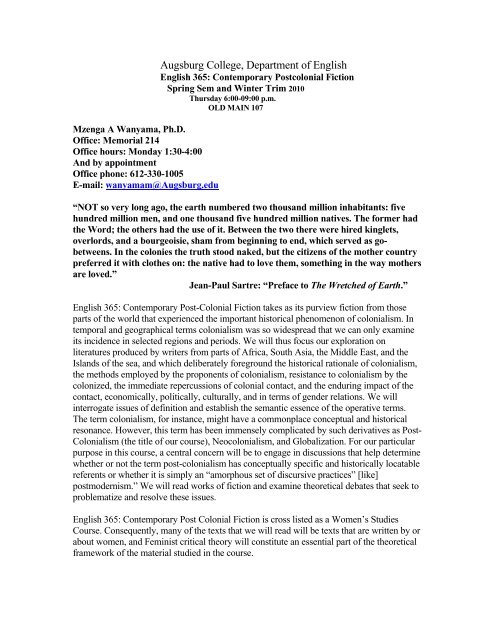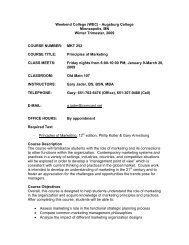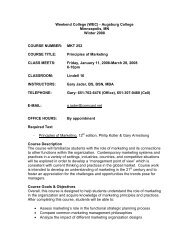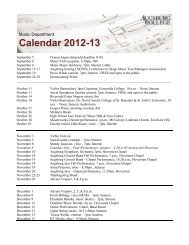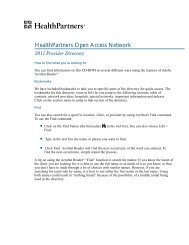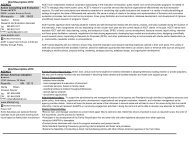Are You suprised ? - Augsburg College
Are You suprised ? - Augsburg College
Are You suprised ? - Augsburg College
You also want an ePaper? Increase the reach of your titles
YUMPU automatically turns print PDFs into web optimized ePapers that Google loves.
Mzenga A Wanyama, Ph.D.<br />
Office: Memorial 214<br />
Office hours: Monday 1:30-4:00<br />
And by appointment<br />
Office phone: 612-330-1005<br />
E-mail: wanyamam@<strong>Augsburg</strong>.edu<br />
<strong>Augsburg</strong> <strong>College</strong>, Department of English<br />
English 365: Contemporary Postcolonial Fiction<br />
Spring Sem and Winter Trim 2010<br />
Thursday 6:00-09:00 p.m.<br />
OLD MAIN 107<br />
“NOT so very long ago, the earth numbered two thousand million inhabitants: five<br />
hundred million men, and one thousand five hundred million natives. The former had<br />
the Word; the others had the use of it. Between the two there were hired kinglets,<br />
overlords, and a bourgeoisie, sham from beginning to end, which served as gobetweens.<br />
In the colonies the truth stood naked, but the citizens of the mother country<br />
preferred it with clothes on: the native had to love them, something in the way mothers<br />
are loved.”<br />
Jean-Paul Sartre: “Preface to The Wretched of Earth.”<br />
English 365: Contemporary Post-Colonial Fiction takes as its purview fiction from those<br />
parts of the world that experienced the important historical phenomenon of colonialism. In<br />
temporal and geographical terms colonialism was so widespread that we can only examine<br />
its incidence in selected regions and periods. We will thus focus our exploration on<br />
literatures produced by writers from parts of Africa, South Asia, the Middle East, and the<br />
Islands of the sea, and which deliberately foreground the historical rationale of colonialism,<br />
the methods employed by the proponents of colonialism, resistance to colonialism by the<br />
colonized, the immediate repercussions of colonial contact, and the enduring impact of the<br />
contact, economically, politically, culturally, and in terms of gender relations. We will<br />
interrogate issues of definition and establish the semantic essence of the operative terms.<br />
The term colonialism, for instance, might have a commonplace conceptual and historical<br />
resonance. However, this term has been immensely complicated by such derivatives as Post-<br />
Colonialism (the title of our course), Neocolonialism, and Globalization. For our particular<br />
purpose in this course, a central concern will be to engage in discussions that help determine<br />
whether or not the term post-colonialism has conceptually specific and historically locatable<br />
referents or whether it is simply an “amorphous set of discursive practices” [like]<br />
postmodernism.” We will read works of fiction and examine theoretical debates that seek to<br />
problematize and resolve these issues.<br />
English 365: Contemporary Post Colonial Fiction is cross listed as a Women’s Studies<br />
Course. Consequently, many of the texts that we will read will be texts that are written by or<br />
about women, and Feminist critical theory will constitute an essential part of the theoretical<br />
framework of the material studied in the course.
The course fulfills the General Education Perspective in Intercultural Awareness<br />
requirement. This requirement proposes that we look at the world (via the medium of<br />
fiction) from points of view other than mainstream western perspectives. Thus, although<br />
post-colonial fiction ordinarily refers to any and all works written about the postcolonial<br />
situation, this course foregrounds works that are written by non-western post-colonial<br />
authors.<br />
The course also fulfills the General Education Skills Requirement in Writing. We will thus<br />
do a substantial amount of writing and peer reviewing in the course in order to meet this<br />
requirement.<br />
Course Texts<br />
Things Fall Apart by Chinua Achebe<br />
So Long a Letter by Mariama Ba<br />
Nervous Conditions by Tsitsi Dangarembga<br />
Houseboy by Ferdinand Oyono<br />
Abeng by Michelle Cliff<br />
A Small Place by Jamaica Kincaid<br />
Funny Boy by Shyam Selvadurai<br />
Cracking India Bapsi Sidhwa<br />
Films (to be determined), handouts, reserve materials<br />
Grading<br />
<strong>You</strong>r grade will be a cumulative average of your scores on all the course assignments below:<br />
Discussion of course materials: this is a crucial element of how the course will be<br />
conducted. I fully expect that you will do all the assigned reading, come to class and<br />
participate actively in the discussions. <strong>You</strong> will get a low grade if you do not do all<br />
the assigned reading and therefore do not get to participate fully in discussions or<br />
you are absent from class and thereby miss the opportunity to share your views with<br />
the class. <strong>You</strong> will receive a failing grade if you are absent from class three times.<br />
<strong>You</strong> will each prepare and present a response to every text that we read in the<br />
course. This will entail offering your original reading of it in response to discussion<br />
points raised by instructor and class mates. Individuals will be assigned discussion<br />
leading responsibilities on specific aspects of the texts.<br />
Unannounced quizzes (TBD). We will have no provision for make-up quizzes but<br />
will allow you to drop the lowest grade<br />
A Midterm<br />
One short paper offering an analysis of A Small Place<br />
Two 6-8 page essays on any aspect of the material we study in class.<br />
Comprehensive Final Exam<br />
Two presentations based the first and third essays written for the course<br />
A conclusive, personal reflection dubbed “3 moments and postcolonial fiction.”<br />
Attendance
Regular attendance and participation in discussions are preconditions for receiving a passing<br />
grade. Any unexcused absences will have a direct adverse effect on your grade.<br />
Cheating and Plagiarism<br />
<strong>College</strong> policies regarding cheating and plagiarism will be followed to the letter. Note: If<br />
you have any concerns or questions about the course, feel free to come to my office hours<br />
and discuss them with me.<br />
COURSE SCHEDULE:<br />
Jan. 14, 2010<br />
Introduction: concepts and definitions; Colonialist writing, Apocalypse Now, Video<br />
Jan. 21, 2010<br />
Chinua Achebe’s Things Fall Apart<br />
Discussion leading and responses on predetermined aspects of Things Fall Apart<br />
Jan. 28, 2010<br />
Discussion leading and responses on predetermined aspects of Jamaica Kincaid’s A Small<br />
Place<br />
Viewing of Life and Debt: Video representation of postcolonial experience, specifically<br />
globalization, in class<br />
Feb. 4, 2010<br />
Presentation of your paper short, researched paper (900-1000 words) in which you offer<br />
your analysis of Kincaid’s A Small Place as a particular depiction of the post colonial<br />
experience. <strong>You</strong> will hand the paper to me at the end of class.<br />
Feb. 11, 2010<br />
Michelle Cliff’s Abeng: discussion leading and responses on predetermined aspects<br />
Feb. 18, 2010<br />
Paper 1 group 1<br />
Write a paper (1800-2200 words) discussing the operations of colonial institutions in Abeng<br />
and applying material on postcolonial critical theory to your analysis. Bring 3 copies of your<br />
essay for group evaluation. The peer group will facilitate further discussion of the text. The<br />
final draft of essay will be due in class on Feb. 25<br />
Mariama Ba’s So Long a Letter discussion leading and responses on predetermined aspects<br />
of the text.<br />
Feb. 25, 2010<br />
Paper 1 group 2<br />
Write a paper discussing the gender issues raised in Ba’s So Long a Letter. Apply relevant<br />
feminist critical material. Bring 3 copies of your essay to class for group evaluation. Final<br />
essay will be due in class on Mar.4, 2010
Discussion leading and responses on Tsitsi Dangarembga’s Nervous Conditions<br />
March 4, 2010<br />
Paper 1 Group 3<br />
Write a paper discussing Dangarembga’s novel under rubrics: Domination and hegemony,<br />
colonial education and traditional education, the native intellectual, or the condition of the<br />
native. Bring 3 copies to class for group evaluation. Final essay will be due one week later<br />
Discussion leading and responses on predetermined aspects of Ferdinand Oyono’s<br />
Houseboy<br />
March 11, 2010<br />
Conclusion of discussion of Houseboy<br />
Midterm<br />
Mar. 25, 2010<br />
Bapsi Sidhwa’s Cracking India: leading discussion and responses on predetermined aspects<br />
of the first part of Cracking India (chapters 1 through16) for the first hour and 20 minutes<br />
Library session to follow from 7:30 PM. Professor Boyd Koehler of Lindell Library will<br />
help us identify research for our paper 2. Plan to use this session to do a comprehensive<br />
search for source materials.<br />
April 1, 2010<br />
Paper 2<br />
Presentation of your research for paper 2 on the fiction of Achebe and Bapsi Sidhwa<br />
exploring issues of colonialism, gender, poverty, exploitation, domination, and hegemony.<br />
Everyone will come to class prepared to present a short summary of the essay to class. Final<br />
essay will be due on April 15<br />
April 8, 2010<br />
Discussion leading and responses on predetermined aspects of Shyam Selvadurai’s Funny<br />
Boy<br />
April 15, 2010<br />
Gillo Pontecorvo, The Battle of Algiers (Film)<br />
Read Frantz Fanon’s “Algeria Unveiled” (Handout)<br />
Discussion of “Algeria Unveiled.”<br />
April 22, 2010<br />
Three moments and postcolonial fiction<br />
Final exam


